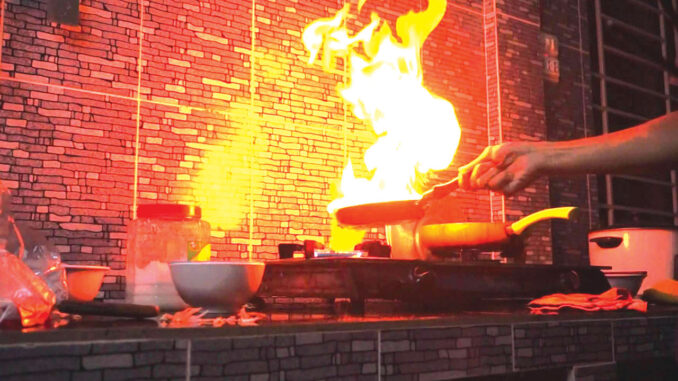
The unchecked increases in the price of domestic gas in the country over the past months is a classic example of the government’s ineptitude and lack of concern for the average citizen, considering its effect of further impoverishing the masses who already are placed among the world’s poorest.
Any government concerned about the economic and social condition of its people should never be content to wave away their suffering merely on account of rising international prices and the falling value of the local currency. Government should be ashamed that it failed to put in place at the right time, proper measures to protect the people against the vagaries of market forces.
Kneejerk policies of Muhammadu Buhari’s administration have often showcased his government’s insensitive disposition to the plights of average Nigerians. Did Buhari’s government truly introduce a retroactive import duty on liquefied natural gas (LNG) at a time that Nigerians are lamenting and struggling to cope with the prevailing increase in the price of cooking gas?
Nigerians have had to bear the burden of paying over a 100 per cent increase for the price of cooking gas in the recent months owing to rising prices of crude oil and natural gas at the international market; but with the imposition of import duties on natural gas products, without facilities to boost location production, the government has simply exposed Nigerians to harsher economic experience in the coming year, particularly with the touted impending increase in the price of petrol and rising inflation.
While stakeholders have questioned the government’s decision particularly as it is alleged importers were given no prior notice, the ensuring cost will no doubt be further passed down to the average Nigerian. Is this the best the government could come up with? What plans has the government put in place to cushion the resultant effects?
Isn’t it ironic that Nigeria which possesses the largest natural gas reserves in the African continent and the 12th largest producer of petroleum in the world is ranked by the World Bank as having the seventh-largest volume under the Global Gas Flaring Tracker Report (GCFR), in spite of which, its citizens still pay exorbitant prices for the use of cooking gas and other petroleum products due to the importation of these refined products? Despite the introduction of several initiatives by successive governments such as the National Gas Expansion Programme (NGEP), Nigeria Gas Flare Commercialisation Programme (NGFCP) and with billions of naira expended on gas exploration, it is sad that Nigeria still imports about 60 per cent of LPG for the domestic market, while a paltry 40 per cent is sourced locally. How is a nation with the largest gas reserve in the African continent unable to satisfy its domestic demands? When will the nation’s political class ever get it right?
Taxation should not be the government’s trump card for revenue generation particularly as local businesses and industries are hamstringed by the absence or inadequacy of requisite production infrastructure, which could have long been achieved but for corrupt practices of political office holders.
With the epileptic power situation in Nigeria, businesses still rely on the use of diesel generators, the cost of which has equally been on the increase. Government needs to employ more ingenious means of generating revenue one of which would be the construction of infrastructure to use gas that would otherwise be flared. It is worrisome that Nigeria allocates the bulk of its revenue for recurrent expenditures against the development of critical capital infrastructures. And in spite of advice by stakeholders, government at various levels are recalcitrant on pruning its size either by cutting down on aides and other political officer holders employed to satisfy political interest and or revisiting agencies and other government parastatals with duplicated responsibilities.
Nigerians are daily confronted with humongous figures that could have been generated with the proper administration of the nations various sources of revenue.
For instance, according to a report by the National Oil Spill Detection and Response Agency (NOSDRA) in 2020 alone, natural gas valued at $1.24 billion was burned by the Nigeria oil & gas industry, one which could generate the annual electricity use of 804 million Nigerian citizens, and an equivalent fine valued at $708 million, much of which is not collected. It has been reported that Nigeria ranks first on the list of countries worldwide affected by oil smuggling with an estimated loss of US$1.5 billion monthly.
According to the Nigeria Extractive Industries Transparency Initiative (NEITI), Nigeria’s annual losses to gold smuggling is in the neighborhood of $9 billion, a situation that could be averted with the provision of adequate manpower, low-level technology, use of remote sensing systems, collaboration with host communities etc. These are but a few means through which the Nigerian economy could receive a boost, yet this government has made it a habit of borrowing to finance its annual budget deficit.
Nigerians are impoverished by the system in which political office holders steal public funds without punishment and to the detriment of the provision of critical infrastructure. Nigerians are by nature industrious and will be willing to pay tax if the government provides an environment to support local business.
Stories abound of how young Nigerians have found ways to eke out a living using the social media platform, Twitter, which has however since been banned by the Federal Government.
According to NetBlocks, a watchdog organisation that monitors cyber-security and governance of the Internet, Nigeria loses N2.46 billion daily owing to the ban. Equally, the introduction of a retroactive tax system as the government has done with import duty on gas products imported from 2019, is disheartening for investors and can precipitate a loss of confidence in the system.
The government should focus on providing an enabling environment for small and medium enterprises to strive and be circumspect about policies that frustrate investors and likely stifle the growth of local industries.
END

Be the first to comment